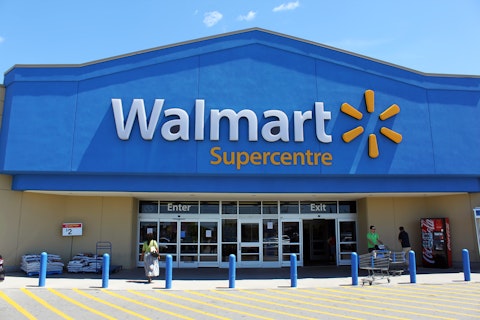In this article, we will look at the 10 Best Discount Retailer Stocks to Buy.
Overview of the Discount Retail Sector
With half a decade of geopolitical chaos, recession in Europe, and above-target inflation, the US economy has remained resilient. The primary reason behind this is the American consumer: their spending makes up around 70% of the country’s gross domestic product. However, recent calculations have been showing a decline in amount of money Americans are spending.
A recent survey by accounting firm KPMG corroborated this pattern, finding that while people were optimistic about their economic standing, they harbored doubts and skepticism about the direction the US economy is headed. The survey also found that nearly 65% of participants expected to do more discount shopping this year. Around 60% of this number made $200,000 or more. In addition, around 14% said that they were planning to use buy now, pay later services.
Brian Moynihan, CEO of Bank of America, said that he also noticed a slowing in purchase rates of his customers. Consumer payments grew by 3.5% since last year, down from a 10% growth from the year before. This included measurement through checks, credit cards, and ATM withdrawals.
The discount retail industry in the US thus holds a promising outlook. This positive outlook is fueled by technological advancements, changing consumer preferences, and strategic adjustments. Shoppers across the retail industry are prioritizing value over everything else, including cheap prices. This is why retailers like Dollar Tree Inc. are struggling, while business in stores like Target and Walmart is booming. A similar trend is also taking place in other industries, with companies like Applebee undergoing increasing sales while consumer sentiments about giants like McDonald’s are showing signs of waning.
The Consumer Goods and Retail Outlook 2024 report by Economic Intelligence forecasts global retail sales to grow by 6.7% in dollar terms in 2024. While 85% of these sales are expected to stem from brick-and-mortar stores, 2024 is expected to be the strongest growth year for offline retail after 2021. Inflation is also easing in 2024, but that does not seem to affect increasing consumer preference for lower prices, prioritization of basic life goods, and an unwillingness to pay hefty delivery fees. These factors are likely to drive consumers on a bargain-hunt to discount retailers.
The discount retail industry is one of the most resilient sectors in the face of economic unpredictability, strengthened by its ability to offer affordable services and goods. Product discount campaigns are emerging across the country, showing positive development trends and becoming some of the hottest topics in retail. Effective inventory management, better pricing, and operational initiatives are likely to boost sales in discount retail companies, provided they offer the one thing customers are increasingly looking for: value.
The US led the largest market for discount store retail across the globe in 2023, amassing $128 billion in sales. According to data reported by The Wall Street Journal, average consumer spending on grocery items at discount retailers increased 71% between October 2021 and June 2022. In addition, consumer patterns are also showing an increased inclination towards e-commerce, which is pushing companies to solidify their digital presence. Successful retailers are endeavoring to meet their customers both in-store and online, which is why 9 out of the top 10 e-commerce websites are run by retailers with brick-and-mortar stores.
Similar trends are appearing across the world, with discount stores rising to a prominent industry standing over the past years in the US, Europe, and Japan. Zhang Qiang, founder and CEO of Hitgoo, a discount retail chain, said that the next decade in China is likely to be marked by discount store expansion. Since the discount store model focuses on food and daily use merchandise, it can be successful in both the domestic and international market, presenting new opportunities.
With these trends showing a promising future for discount retailers, let’s look at the 10 best discount retailer stock to buy.

Niloo / Shutterstock.com
Our Methodology
We used the Finviz stock screener to identify stocks in the discount retailers business. We then shortlisted the stocks that were the most widely held by hedge funds, as of Q2 2024. The stocks are ranked in ascending order of the number of hedge funds that have stakes in them.
Why are we interested in the stocks that hedge funds pile into? The reason is simple: our research has shown that we can outperform the market by imitating the top stock picks of the best hedge funds. Our quarterly newsletter’s strategy selects 14 small-cap and large-cap stocks every quarter and has returned 275% since May 2014, beating its benchmark by 150 percentage points (see more details here).
10 Best Discount Retailer Stocks to Buy
10. BBB Foods Inc (NYSE:TBBB)
Number of Hedge Fund Holders: 13
BBB Foods (NYSE:TBBB) is a Mexico-based discount retailer that manages the sale, acquisition, purchase, and distribution of all kinds of consumer goods and products. It also operates stores and distribution centers to market and sell these products. The company has a broad product range, comprising approximately 800 stock-keeping units (SKUs) of private, branded, and spot products. It also owns two Scottish companies: Lothian Shelf Limited and BBB Foods Limited Partnership.
BBB Foods (NYSE:TBBB) opened 121 new stores and an innovative distribution center in Q2 2024, bringing its total store count to 2,503 as compared to 2,288 stores at the end of 2023. It has opened 215 new stores since the start of 2024. The company’s expansion strategy appears on track, with plans to inaugurate around 380 to 420 new stores before the end of 2024.
BBB Foods (NYSE:TBBB) is undergoing continuous revenue growth powered by its expanding store network and strong underlying consumer demand. Its decentralized approach to expansion is proving effective, increasing same-store sales by 10.7% for the quarter. The company’s total revenue also grew by 27.5% year-over-year for the quarter.
However, sales growth in Q2 2024 was slow as compared to Q2 2023 due to several reasons, some of which included Easter falling in Q1 instead of Q2 like in 2023, alcohol sale restrictions in Mexico due to the June 2024 election, weather conditions, and the shifting of some government payment to Q1 from Q2 due to the June elections. Despite these short-term conditions, same-store sales for the company remained above the industry average. The company’s positive EBITDA margins and seamless working capital management are the primary drivers behind this self-funded growth.
BBB Foods (NYSE:TBBB) holds an advantage due to the strength of its business model, which is running on a growth trajectory of store growth, increased value generation, and increased sales per store. The stock sports a consensus Buy rating among analysts, and its median price target of $28.98 implies an upside of 11.01% from current levels. Investors are bullish on the stock, with BofA Securities maintaining their Buy rating for the stock. 13 hedge funds hold the stock as of Q2 2024.
Argosy Investors stated the following regarding BBB Foods Inc. (NYSE:TBBB) in its first quarter 2024 investor letter:
“While a small position, it is worth explaining what I find attractive about BBB Foods Inc. (NYSE:TBBB). Started by a McKinsey consultant (not always a sign of an attractive investment), Tiendas BBB is a hard discounter a la Aldi or Lidl, retailers well-known in the United States. TBBB operates over 2,200 stores in Mexico, with visibility to 12,000 stores over the long term, and I believe the potential for even more beyond that. As with Aldi, TBBB offers a limited number of primarily private label products, approx. 2,000-3,000, at less than 15% gross margins, in relatively small stores supplied by an efficient supply chain network. These metrics compare to competitors who stock tens of thousands of items, mostly third-party brands, and at gross margins >20%.
What allows the hard discounter model to thrive is the low number of stock-keeping units (SKUs), which results in higher sales per SKU, which allows the hard discounter to negotiate competitively at even a small scale vs other retailers. As their scale grows, hard discounters can negotiate increasingly better prices with suppliers, placing greater pressure on competitors who already operate on thin margins. Also as a result of the low number of SKUs, hard discounters are able to negotiate attractive payment terms, and because their inventories remain low as a result of high inventory turnover, they have negative working capital and generate positive cash flow as basically a perpetual loan from their suppliers. This cash flow allows hard discounters to pay for their growth without incurring significant debt.
As a result, we estimate TBBB’s 2020-2023 growth was 33% per year, while long-term debt only grew at a 5% rate. Because of the characteristics discussed here, TBBB is capable of growing stores by 15% per year in addition to growing same-store sales at 5-10% per year going forward. It seems likely they can continue at this pace for the next 10-15 years and returns could approach or exceed 20% per year.”
9. PriceSmart, Inc. (NASDAQ:PSMT)
Number of Hedge Fund Holders: 21
PriceSmart Inc. (NASDAQ:PSMT) owns and operates American-style membership warehouse clubs in South America, the Caribbean, and Central America. It is seldom called the Costco of South America and operates through 54 warehouse clubs located in 12 countries and one US territory. It offers its members a wide array of services and merchandise, including categories such as consumables, health services, fresh food, hardline, and bakery.
PriceSmart (NASDAQ:PSMT) is running on positive financials. Its net merchandise sales reached almost $1.2 billion in Q3 fiscal 2024, with total revenue of over $1.2 billion. Total revenue for the nine months ending May 31, 2024, came to $3.7 billion. There are several growth drivers for the company, starting with real estate. PriceSmart (NASDAQ:PSMT) plans to open its ninth warehouse club in Costa Rica and has acquired a six-acre property for the purpose. Its expansion is continuing to solidify its position in the industry, expanding its customer base and earning it a competitive advantage. Estimated to become functional in Spring 2025, the opening of the Costa Rica warehouse would bring the company’s total count to 55.
In addition, PriceSmart (NASDAQ:PSMT) is remodeling several high-volume clubs located in Honduras, Dominican Republic, and Trinidad and Tobago. It is also expanding its cubs in El Salvador, Costa Rica, and Jamaica, further establishing its regional presence. The company is also actively working out ways to enhance its distribution infrastructure. It started using distribution centers by a third-party in four different markets in Q3: El Salvador, Guatemala, Honduras, and Nicaragua. Opening distribution centers will allow the company to reduce debt landing costs, improve working capital, and reduce lead time.
Another of the company’s growth drivers is its omnichannel shopping options for customers, which include sales through its desktop website and app. Total net merchandise sales through digital channels increased by 27% in Q3 2024 as compared to Q3 2023, representing a record 5.5% of the total net merchandise sales for the company in the quarter. The stock has a consensus Buy rating among analysts, and its median price target of $85.40 implies an upside of 5.39% from current levels. 21 hedge funds hold stakes in the stock as of Q2 2024, and Nitorum Capital is the largest shareholder.
8. Ollies Bargain Outlet Holdings (NASDAQ:OLLI)
Number of Hedge Fund Holders: 27
Ollies Bargain Outlet Holdings (NASDAQ:OLLI) operates as a retailer of brand-name closeout merchandise and excess inventory. Principally, the company buys overstocked, overproduced, and closeout merchandise from wholesalers, manufacturers, brokers, distributors, and other retailers to sell to its customers. It operates in a warehouse format, featuring a wide array of categories ranging from hardware, clothing, and sporting goods to health and beauty, food, electronics, and much more.
The company has more than 513 stores across the US. It expects to open around 50 stores in 2024, with 70% of the openings taking place in the second half of the year. The company’s ultimate goal is to surpass the benchmark of 1,300 stores. To support its continued growth, Ollies is investing in supply chain, marketing, information technology, and its processes, all to streamline execution.
Ollies Bargain Outlet’s (NASDAQ:OLLI) exceptionally affordable deals give it a strong edge in the market. Its comparable store sales grew by 5.8% in Q2 2024, driven by growth in both basket and transactions. The company’s 42 years of industry experience, scale, and size is another strategic advantage fueling its growth. While other retailers sell stuff cheap, Ollies Bargain Outlet’s (NASDAQ:OLLI) holds a value proposition of selling “good” stuff for cheap. It sells nationally branded products at prices 20% to 70% lower than other stores, which resonates with its audience and shows no signs of going out of style. Customers are increasingly responding to the company’s deals and discounts, driving growth.
Ollies Bargain Outlet’s (NASDAQ:OLLI) also acquired several 99 Cents Only stores and is prioritizing their opening to accelerate its store growth over the next 18 months. A majority of these stores are set to open in September, and are expected to drive growth for the company because of their strategic locations. The company’s net sales increased by 12%, reaching $578 million due to new store growth and a 5.8% increase in comparable store sales.
Harding Loevner Global Small Companies Equity Strategy made the following comment about Ollie’s Bargain Outlet Holdings, Inc. (NASDAQ:OLLI) in its Q3 2023 investor letter:
“In the US, discount retailer Ollie’s Bargain Outlet Holdings, Inc. (NASDAQ:OLLI) gained sharply after the company reported accelerating same-store sales growth as higher-income customers found value in the company’s offerings.”





